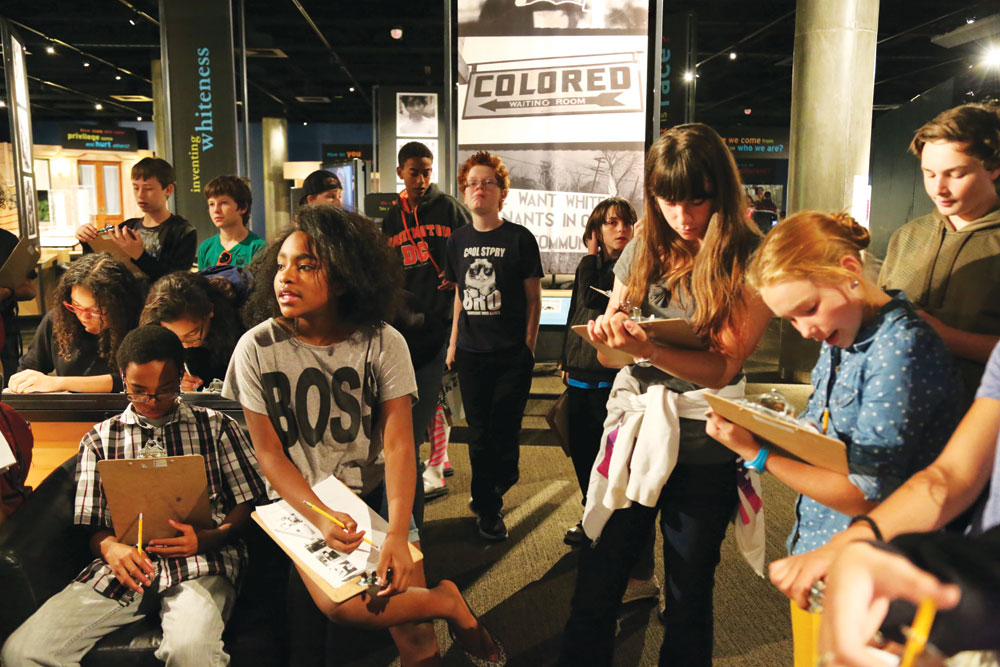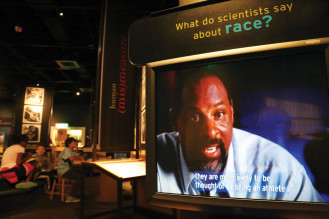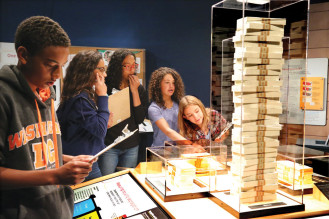 Students in the seventh- and eighth-grade classes at Odyssey School of Denver have features of many multiracial backgrounds: large and thin eye shapes, course and fine hair, the whole spectrum of light to dark skin colorings. Plus they wear all types of clothes, including one kid in a blue furry hat shaped like an alien with an eyeball hanging from the end. The many differences, quirks and ambiguous ethnic features blend into one diverse group.
Students in the seventh- and eighth-grade classes at Odyssey School of Denver have features of many multiracial backgrounds: large and thin eye shapes, course and fine hair, the whole spectrum of light to dark skin colorings. Plus they wear all types of clothes, including one kid in a blue furry hat shaped like an alien with an eyeball hanging from the end. The many differences, quirks and ambiguous ethnic features blend into one diverse group.

A student from Odyssey School of Denver stops to look at a photo at the History Colorado Center exhibit, RACE: Are we so different? The exhibit moves through history and examines how race has played out in work, science, life experience, and more.

Odyssey students discuss whether it’s relevant to have race included on census surveys.
“At my old schools you were Hispanic, black or white. It was those three categories and nothing else, and that’s how you would determine who you hung out with. But at Odyssey, they make sure race is not a thing,” Najah Johnson says.
“We looked around and everybody was just kind of mixing in with each other,” says Najah’s twin brother, Amir. The Johnson twins like to celebrate all of their races—Native American, white and African American.
Discussing race can be sensitive and challenging, but Odyssey students seem very comfortable and discuss thoughtfully how it’s played a part in their life.

Above: Evolutionary biologist Joseph Graves discusses the science of race and how American society has created a mythology about African American males being more likely to be athletes than intellectuals.
To celebrate race and consider how our society thinks and talks about it, the seventh- and eighth-grade classes recently visited the History Colorado Center exhibit, RACE: Are we so different?
The traveling exhibit began in the early 2000s and is visiting Denver for the first time. Differences among people are cause for joy and sorrow, an introduction to the exhibit explains. These differences are the basis to celebrate personal identity—our family background, country, and language. But, those differences are also the basis for discrimination and oppression. The exhibit moves through history and how race has played out in science, life experience, and more.
“I like the exhibit a lot because it touches on a lot more than just black and white,” Najah says. She thinks that’s one of the main problems in discussing race.

Piles of cash represent the average net worth of families based on race. The net worth of whites is much higher, showing the wealth gap is related to race.
Odyssey students considered how they define race. Is it based on skin color? No, skin color shouldn’t matter. What about culture? Culture is like who you are and race is what you look like or where you’re from. So then does skin color matter? Well, it’s more the meaning of your skin color that matters. Do you at times automatically make assumptions based on skin color?
“It’s something I’ve done before where I’ll be walking and my brain just clicks in and starts thinking these stereotypes about who a person is or what a person is,” Kohana Reiva says. “I’m not proud of that. It’s not something I like to do.” He has light-colored zag-zag hair, which he gets from his mom.
Other students nod in agreement. “I think it’s something that everybody has in common. No matter the personality, what race you are or what you look like, you’re always going to make assumptions of other people, even if you don’t mean to,” Najah says. “They could be good or bad.”
They say making assumptions doesn’t make you a bad person, but what matters is being OK with being wrong about those assumptions. “It’s like very first glance you think something, but then you kind of try to correct yourself because you know there is more to that person. If you stick to that one mindset and ‘Oh I’m not going to talk to them or interact with them because they’re different,’ that’s bad because they could be a really good person,” Francesa Cecchini says. She has grown up around a variety of races and personalities, and hates when people categorize anyone based on one thing.
One part of the exhibit displays head shots of people of many different backgrounds. Below they write how they define themselves. Some said “human,” others listed all of their races, some wrote the race they identify with most, and then some wrote what they like to do. Some of the answers are surprising and challenge first impressions.
Like the display, the students have been surprised how wrong they have been about people at Odyssey. “It’s not even just about race. It’s just general appearance or personalities you don’t think you can click with, but I’ve made some surprising friendships,” Najah says. “It just shows you how alike you are to a person, like what different kinds of things you like or the same things you like to do.”



0 Comments